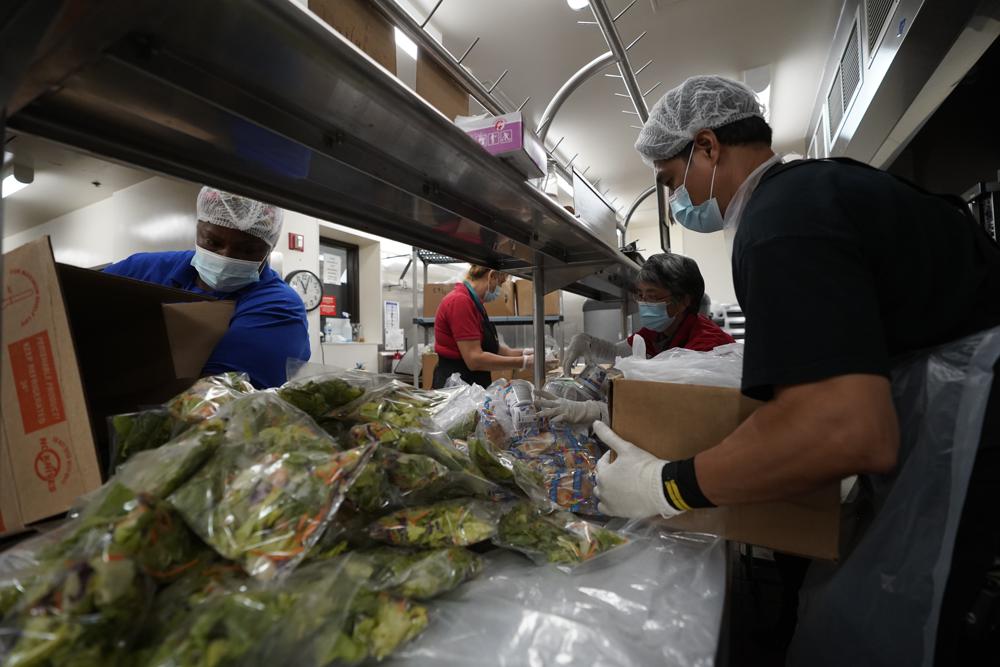A bill that would make California the first in the nation to phase out “particularly harmful” ultra-processed foods from the 1 billion school meals served in the state each year faces a key Senate committee hearing next week as critics question how far it might go in striking popular and seemingly healthy items like yogurt and granola bars from the lunch menu.
The bill, AB 1264, would task state scientists with identifying “particularly harmful” ultra-processed foods based on scientific research linking them to cancer, cardiovascular disease, metabolic disorders, neurological or behavioral issues, and other health harms for phase out by 2032.
“Our public schools should not be serving students ultra-processed food products filled with chemical additives that can harm their physical and mental health and interfere with their ability to learn,” said bill author Assemblyman Jesse Gabriel, a Democrat representing the San Fernando Valley and a father to three boys in California’s school system.
The bill is opposed by a coalition of 23 food banks, ethnic chambers of commerce and industry groups including grain, egg, poultry, bean and fruit producers and suppliers across the state who say that even after amendments, the bill still endangers common, healthy and culturally significant items while increasing regulatory hoops and risk of costly lawsuits.
“We still share significant concerns that the bill’s definition of ultra-processed food is overly broad,” said Scott Korinke, representing Californians for Affordable Food, an industry coalition opposing the bill.
In a column for the Los Angeles Sentinel, Jay King, president and CEO of the California Black Chamber of Commerce, said the bill will hurt Black communities and small, Black-owned businesses in the states, which are disproportionately located in food deserts, with 1 of 5 households experiencing food insecurity.
The proposed legislation has gone through five rounds of amendments since its introduction in March over concerns that the regulation will problematize innocuous, key items like non-dairy milk extracted from rice or almonds, waxed apples and many tomato products based on technicalities.
Gabriel said a growing number of stakeholders have continued tightening criteria based on scientific research and FDA regulations, which point toward reducing additives and technical effects, and excessive levels of sugar, fat, or salt. The bill also creates a space for scientists and researchers to drill down further to identify the worst subsets of processed foods that have got to go–ingredients proven to cause disease, food addiction and behavioral problems.
“We just don’t see numbers — we see kids,” said Ravinder Khaira, a supporter representing the American Academy of Pediatrics.”
Khaira said two thirds of calories students consume come from ultra-processed foods and that the impacts are not distant risks but daily consequences of chronic diseases of obesity, Type 2 diabetes, behavior issues, anxiety and depression seen daily in young patients.
Miguel Villarreal, interim co-executive director of the National Farm to School Network followed, another supporter, called the measure “a long time coming” and said processed foods have dominated school food services for too long, but not because school food service directors didn’t care or didn’t want change.
“It’s because of industry pressure, tight district budgets, and outdated policies that don’t always make children’s nourishment a priority,” Villarreal said, reflecting on his four decades of work in school nutrition and recalling “literally a ton of processed food” he found in California schools when he first moved here the early 2000s.
He said the bill would do more than improve children’s nutrition.
“It’s going to create stronger rural communities and more resilient food systems here in California,” he said.
Gabriel’s bill follows two other laws he successfully pushed through in the past two years. In 2023, AB 418, otherwise known as the California Food Safety Act, banned brominated vegetable oil, potassium bromate, propylparaben, and Red 3 dye from all food products manufactured, sold, delivered, distributed, held, or offered for sale, effective on Jan. 1, 2027.
In 2024, AB 2316, the California School Food Safety Act, prohibited the use of Red 40, Yellow 5, Yellow 6, Blue 1, Blue 2, and Green 3 — synthetic dyes linked to behavioral and developmental issues–by Dec. 31, 2027.
And earlier this year, Governor Gavin Newsom issued an Executive Order directing state officials to crack down on ultra-processed foods and further investigate food dyes.
Nationwide changes in response to these statewide reforms include a ban by the U.S. Food and Drug Administration of two of the chemicals cited in AB 418.
Bernadette Del Chiaro, senior vice president of the national nonprofit Environmental Working Group, said Gabriel’s prior legislation has “ignited a national food safety movement that has touched over 30 state legislatures, the halls of Congress, and the White House.” She named Arizona, Utah, Louisiana, Texas, Virginia and West Virginia as the most recent states that have followed California’s example in just the past year.
Gabriel said this endeavor was personal. He grew up with ADHD and is helping his son navigate the same condition, which has now been linked to additives in processed foods.
Gabriel said hammering out definitions and enforcing them is a complex task but that the moral question was simple whether to choose safety for children or corporate profits and that the precedent set by the state could have impact around the globe, where plenty of other countries have stricter food safety standards for their children.
“They can still make money,” Gabriel said, “and they can do right by our kids.”





